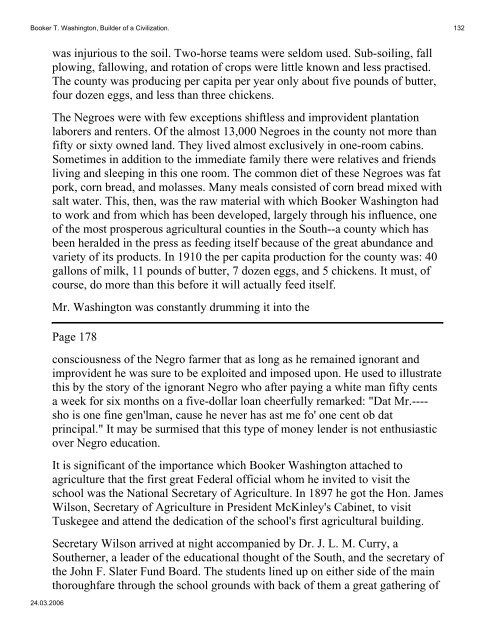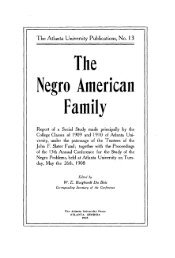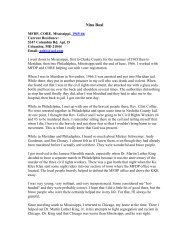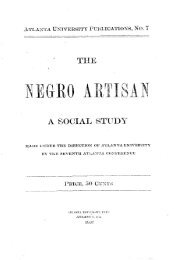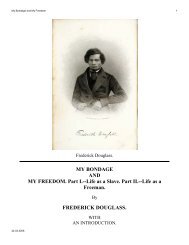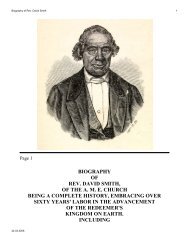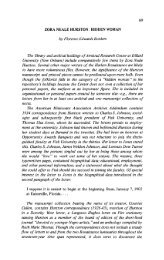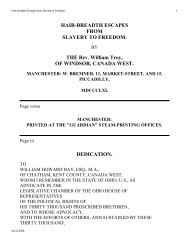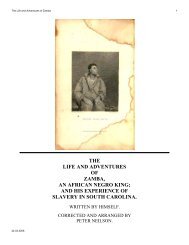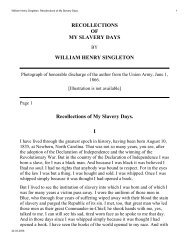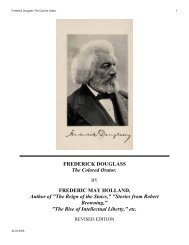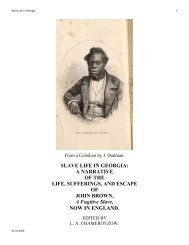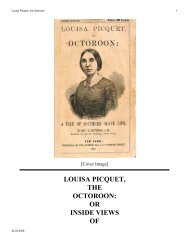Booker T. Washington, Builder o - African American History
Booker T. Washington, Builder o - African American History
Booker T. Washington, Builder o - African American History
Create successful ePaper yourself
Turn your PDF publications into a flip-book with our unique Google optimized e-Paper software.
<strong>Booker</strong> T. <strong>Washington</strong>, <strong>Builder</strong> of a Civilization. 132<br />
24.03.2006<br />
was injurious to the soil. Two-horse teams were seldom used. Sub-soiling, fall<br />
plowing, fallowing, and rotation of crops were little known and less practised.<br />
The county was producing per capita per year only about five pounds of butter,<br />
four dozen eggs, and less than three chickens.<br />
The Negroes were with few exceptions shiftless and improvident plantation<br />
laborers and renters. Of the almost 13,000 Negroes in the county not more than<br />
fifty or sixty owned land. They lived almost exclusively in one-room cabins.<br />
Sometimes in addition to the immediate family there were relatives and friends<br />
living and sleeping in this one room. The common diet of these Negroes was fat<br />
pork, corn bread, and molasses. Many meals consisted of corn bread mixed with<br />
salt water. This, then, was the raw material with which <strong>Booker</strong> <strong>Washington</strong> had<br />
to work and from which has been developed, largely through his influence, one<br />
of the most prosperous agricultural counties in the South--a county which has<br />
been heralded in the press as feeding itself because of the great abundance and<br />
variety of its products. In 1910 the per capita production for the county was: 40<br />
gallons of milk, 11 pounds of butter, 7 dozen eggs, and 5 chickens. It must, of<br />
course, do more than this before it will actually feed itself.<br />
Mr. <strong>Washington</strong> was constantly drumming it into the<br />
Page 178<br />
consciousness of the Negro farmer that as long as he remained ignorant and<br />
improvident he was sure to be exploited and imposed upon. He used to illustrate<br />
this by the story of the ignorant Negro who after paying a white man fifty cents<br />
a week for six months on a five-dollar loan cheerfully remarked: "Dat Mr.----<br />
sho is one fine gen'lman, cause he never has ast me fo' one cent ob dat<br />
principal." It may be surmised that this type of money lender is not enthusiastic<br />
over Negro education.<br />
It is significant of the importance which <strong>Booker</strong> <strong>Washington</strong> attached to<br />
agriculture that the first great Federal official whom he invited to visit the<br />
school was the National Secretary of Agriculture. In 1897 he got the Hon. James<br />
Wilson, Secretary of Agriculture in President McKinley's Cabinet, to visit<br />
Tuskegee and attend the dedication of the school's first agricultural building.<br />
Secretary Wilson arrived at night accompanied by Dr. J. L. M. Curry, a<br />
Southerner, a leader of the educational thought of the South, and the secretary of<br />
the John F. Slater Fund Board. The students lined up on either side of the main<br />
thoroughfare through the school grounds with back of them a great gathering of


